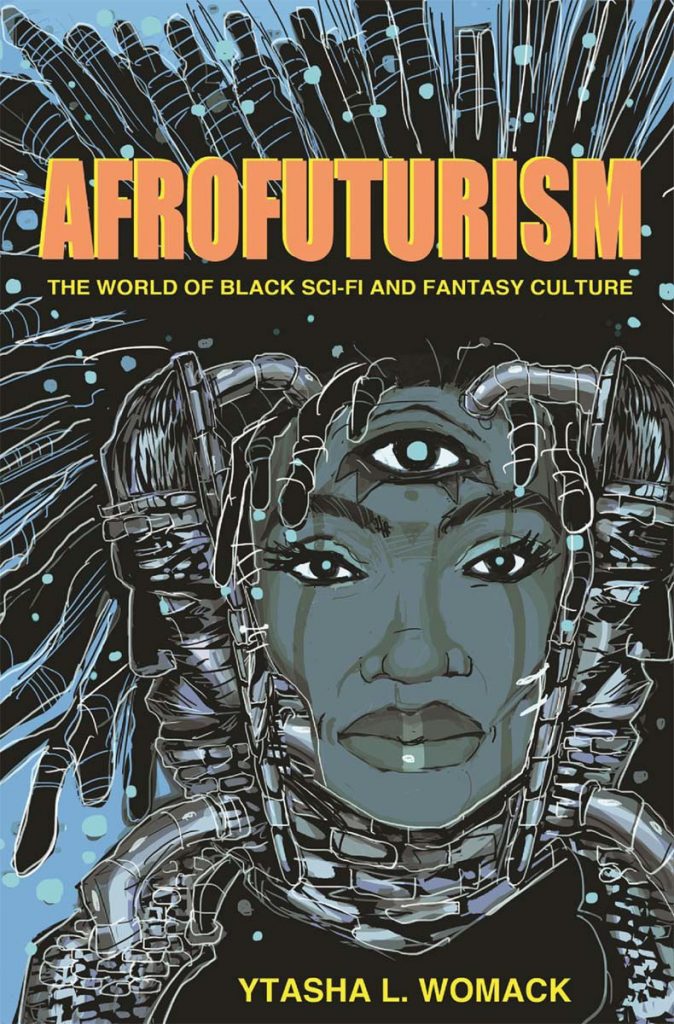Octavia Butler was a sci-fi author prominent in the 70s, 80s, and the 90s. She died in 2006, but seems to be having a current revival of interest.
A multiple recipient of both the Hugo and Nebula awards, she became in 1995 the first science-fiction writer to receive a MacArthur Fellowship. She was also the first Black woman to write sci-fi. It took the Kingdom of Wakanda to rock the cinema world to the possibility of blockbuster, futuristic, Black sci-fi by way of Marvel Comic’s Black Panther in 2018.
The term ‘Afrofuturism’ was coined in 1994 by cultural critic, Mark Dery in his edited collection, Flame Wars: The Discourse of Cyberculture. Dery uses the term Afrofuturism to define, “speculative fiction that treats African-American themes and addresses African-American concerns in the context of 20th century technoculture — and more generally, African-American signification that appropriates images of technology and a prosthetically enhanced future.” In his essay, “Black to the Future,” he writes about the features he saw as common in African-American science fiction, music and art.
Click to RSVP for links to a Watch Party on Zoom on Saturday, April 24 at 7 PM.

We will explore Afrofuturism in sci-fi films with a short video introduction by Criterion curatorial director Ashley Clark recorded in 2020.
Then, we will review and discuss a collection of films by Black sci-fi filmmakers beginning with “The Becoming Box” directed by Monique Walton • 2011 • United States
In the aftermath of Hurricane Katrina, a mysterious box appears in the backyard of three siblings—a portal that may offer an escape from their surroundings.
Followed by “Robots of Brixton” directed by Kibwe Tavares • 2011 • United Kingdom
Tensions erupt among a group of young robots attempting to survive the daily grind.
Then after a 5-minute bio-break we’ll review, “The Last Angel of History” directed by John Akomfrah • 1996 • United Kingdom
Cofounder of the influential Black Audio Film Collective, John Akomfrah crafted this experimental blend of sci-fi parable and essay film, which also serves as an essential primer on the aesthetics and dynamics of contemporary Afrofuturism. Interviews with esteemed musicians, writers, and cultural critics are interwoven with the fictional story of a “data thief,” who must travel through time and space in search of the code that holds the key to his future.
…and a few short sci-fi films by Larry Achiampong from “The Relic Quadrilogy.”
Part of a sprawling, ongoing multimedia project by artist Larry Achiampong, these films imagine a future in which the global West has begun a decline into obsolescence, while a unified Africa ascends into prosperity, harmony, and a leadership role in the world, an Afrofuturist utopia in which so-called Relic Travelers journey across Britain and the world collecting the remnants and testimonies of a colonial past. Layering image, voice-over, and evocative music to create an immersive audiovisual experience, the RELIC films are both hopeful visions of a rising Africa and mournful elegies for a tragic history.
Read “Ghosts of the Future: A Conversation with Larry Achiampong.”
Afrofuturism: The World of Black Sci-Fi and Fantasy Culture
Paperback – October 1, 2013
by Ytasha L. Womack (Author)
In this hip, accessible primer to the music, literature, and art of Afrofuturism, author Ytasha Womack introduces readers to the burgeoning community of artists creating Afrofuturist works, the innovators from the past, and the wide range of subjects they explore. From the sci-fi literature of Samuel Delany, Octavia Butler, and N. K. Jemisin to the musical cosmos of Sun Ra, George Clinton, and the Black Eyed Peas’ will.i.am, to the visual and multimedia artists inspired by African Dogon myths and Egyptian deities, the book’s topics range from the “alien” experience of blacks in America to the “wake up” cry that peppers sci-fi literature, sermons, and activism. With a twofold aim to entertain and enlighten, Afrofuturists strive to break down racial, ethnic, and social limitations to empower and free individuals to be themselves.

